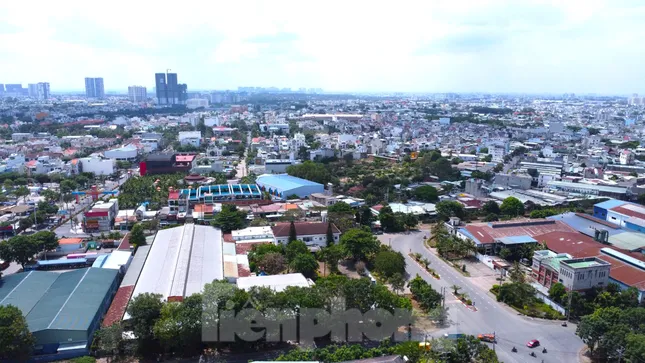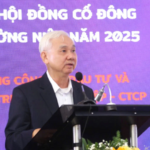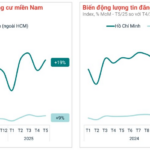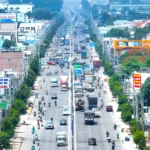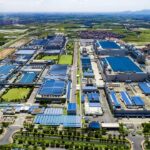On June 24, many businesses in Binh Duong expressed their concerns to our reporters as the deadline for their relocation looms, yet they are still awaiting further instructions on whether to move or stay.
Previously, Binh Duong implemented a project to investigate, evaluate, and propose support policies for enterprises outside industrial parks and clusters in the southern region to transform and relocate to industrial parks and clusters in Binh Duong Province. The project was scheduled to be carried out from 2020 to 2030.
According to the plan, Binh Duong will organize the relocation of enterprises in the Binh Duong Industrial Park (Di An City) in 2025 and some enterprises that voluntarily registered for relocation and transformation. After the pilot implementation, experiences will be summarized. Subsequently, the transformation and relocation of enterprises outside the parks and clusters into the parks and clusters will be carried out according to the roadmap.
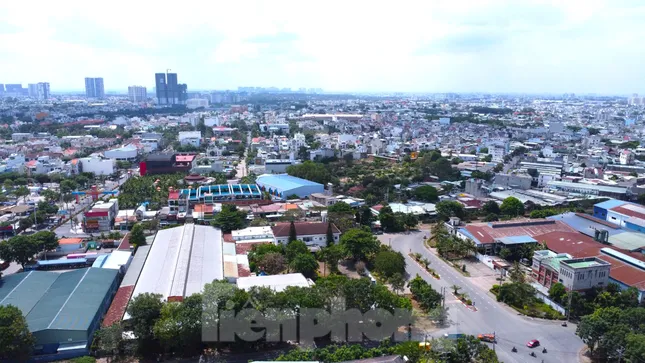
The plan is to relocate businesses in the southern region of Binh Duong Province to the northern region.
As per the roadmap, enterprises in Thuan An City will be relocated by 2028, and those in Tan Uyen City, Thu Dau Mot City, Ben Cat Town, and Di An City will be relocated by 2029.
To implement the project, the southern region of Binh Duong Province will not grant new licenses to enterprises. For existing enterprises, their licenses will be extended for five years to give them time to prepare for the relocation.
Since being informed about the project, some enterprises have started planning and even investing in the construction of new facilities in the northern region, hoping to comply with the province’s direction and soon stabilize their production and business activities at the new locations.
However, as Binh Duong is now merged into Ho Chi Minh City, enterprises are uncertain about the project’s continuation.
“We are in a dilemma about whether to move or stay as Binh Duong is merged with Ho Chi Minh City. We need timely information related to the project to make necessary calculations,” shared a representative of a footwear company in Binh Duong Province (name withheld).
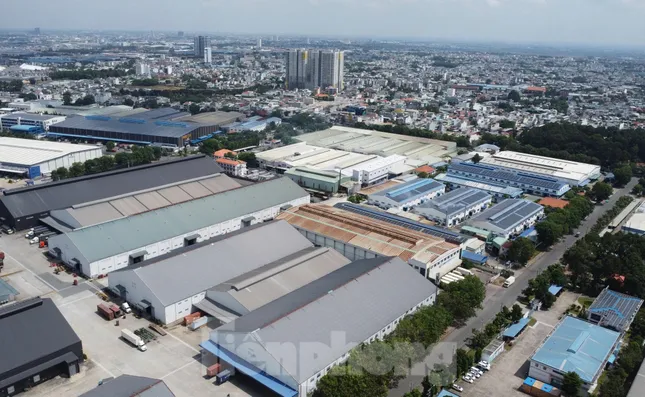
A corner of Di An City, the southern region of Binh Duong Province bordering Ho Chi Minh City
Representatives of several enterprises shared that they support the relocation of factories out of residential areas and into industrial parks and clusters. This is a long-term development orientation, creating a healthy living environment for the people, and the enterprises are ready to move. “I hope that even with the merger with Ho Chi Minh City, the enterprise relocation project will continue,” said a leader of an enterprise, expressing the desire to access relevant information soon.
Regarding the above project, a representative of the Binh Duong Department of Industry and Trade said that the province has a separate planning, which has been announced. However, with the merger into Ho Chi Minh City, there will be overall adjustments to align with the city’s development orientation. Therefore, the enterprise relocation project is temporarily suspended pending the handover. After the unified planning of Ho Chi Minh City is completed, the next steps of the project will be carried out.
The representative of the Binh Duong Department of Industry and Trade added that the authorities have been re-evaluating the number of enterprises to be relocated and transformed because the data of 2,900 factories from the 2019 statistics is no longer consistent with the current situation.
Due to the development process, many factories and enterprises have transformed, relocated, and upgraded their technology over the years. Therefore, it is necessary to carefully review and assess the situation to align with the present context. The spirit of Binh Duong Province’s direction is that there will still be enterprises allowed to operate in the city, and their production activities must comply with the province’s development planning and legal regulations.
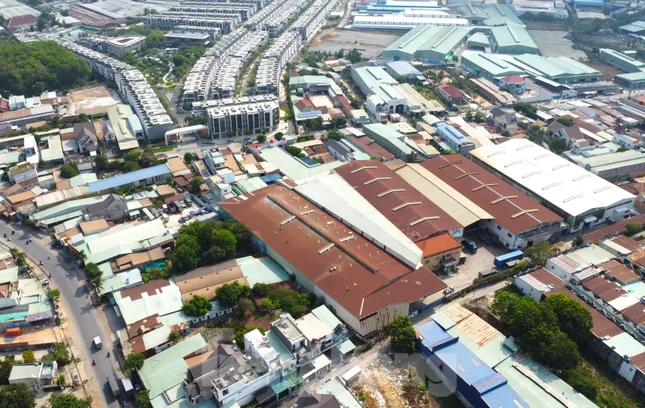
The relocation of enterprises from residential areas is a correct policy, agreed upon by both enterprises and local people.
Regarding the utilization of the vacated land, the leader of the Department of Industry and Trade said that the province will have policies to support enterprises in transforming their functions, converting the purpose of using the land and workshops at the old locations in line with the province’s planning.
The Binh Duong Department of Industry and Trade also said that the support policies for enterprises and employees are designed with specific objects and flexible content to ensure consensus and serve the harmonious interests of employees, enterprises, and the state.
To facilitate the relocation of enterprises, Binh Duong has planned eight industrial parks with a total area of about 5,842 hectares, including Cay Truong, Bau Bang 3, Bau Bang 4, Bac Tan Uyen 2, Bac Tan Uyen 4, Dau Tieng 1A, Dau Tieng 5, and Phu Giao 4. In addition, 25 clusters with a total area of about 1,743 hectares have been planned to serve the relocation, located in Dau Tieng (10 clusters, 725 hectares), Bac Tan Uyen (7 clusters, 493.5 hectares), and Phu Giao (8 clusters, 524.46 hectares) districts.
A Sudden Change in Leadership: BCM Appoints a Familiar Face as its New CEO
After nearly seven years at the helm, Becamex IDC unexpectedly announced the dismissal of Mr. Pham Ngoc Thuan as CEO. Notably, his successor is Mr. Nguyen Hoan Vu, a former employee of the company.
“The Dynamic Duo”: How Mergers and Infrastructure are Supercharging Ho Chi Minh City’s Real Estate Market
The approval of the resolution to merge provinces and cities by the National Assembly on June 12, 2025, has immediately brought the real estate market of the new Ho Chi Minh City (encompassing Ho Chi Minh City, Binh Duong, and Ba Ria-Vung Tau) into the spotlight. With the largest economy and population in the country, the real estate landscape in this region is anticipated to undergo significant transformations in the upcoming period.
From Above: A Bird’s-Eye View of the Upgraded 6-Lane Interchange in Binh Duong
The three routes in Binh Duong province, spanning over 47 kilometers, have been upgraded to a impressive six-lane highway, complete with sidewalks, lush greenery, and illuminating streetlights. This transformative project seamlessly connects various industrial parks, creating an interconnected network. The highway is now open and ready to serve the community.
The Future of Hai Duong: Unveiling Plans for 5 New Industrial Parks Spanning Over 900 Ha
The People’s Council of Hai Duong Province has recently approved the planning of five new industrial parks in the region. This strategic move underscores the province’s commitment to fostering economic growth and transforming the area into a bustling hub of industrial activity. With a vision to create a vibrant and sustainable future, these industrial parks are designed to attract investment, generate employment opportunities, and propel Hai Duong towards a prosperous tomorrow.
“Refining the Legal Framework for Sole Proprietorships: Encouraging Household Businesses to Embrace the Benefits of Incorporation.”
“The President of the National Assembly has requested that the Minister of Finance, the Government, and related ministries and branches propose amendments to the Law on Supporting Small and Medium-sized Enterprises. They are also tasked with reviewing and completing the legal framework for business registration, encouraging household businesses to transform into enterprises, and providing specific guidance on abolishing the lump-sum tax payment for household businesses.”

